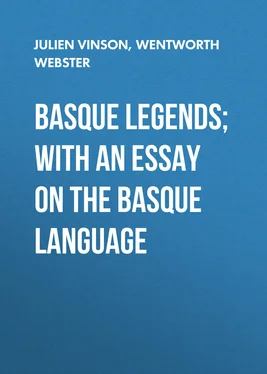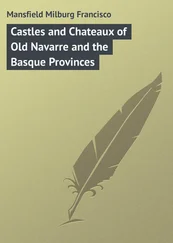Julien Vinson - Basque Legends; With an Essay on the Basque Language
Здесь есть возможность читать онлайн «Julien Vinson - Basque Legends; With an Essay on the Basque Language» — ознакомительный отрывок электронной книги совершенно бесплатно, а после прочтения отрывка купить полную версию. В некоторых случаях можно слушать аудио, скачать через торрент в формате fb2 и присутствует краткое содержание. Жанр: foreign_antique, Старинная литература, Мифы. Легенды. Эпос, на английском языке. Описание произведения, (предисловие) а так же отзывы посетителей доступны на портале библиотеки ЛибКат.
- Название:Basque Legends; With an Essay on the Basque Language
- Автор:
- Жанр:
- Год:неизвестен
- ISBN:нет данных
- Рейтинг книги:3 / 5. Голосов: 1
-
Избранное:Добавить в избранное
- Отзывы:
-
Ваша оценка:
- 60
- 1
- 2
- 3
- 4
- 5
Basque Legends; With an Essay on the Basque Language: краткое содержание, описание и аннотация
Предлагаем к чтению аннотацию, описание, краткое содержание или предисловие (зависит от того, что написал сам автор книги «Basque Legends; With an Essay on the Basque Language»). Если вы не нашли необходимую информацию о книге — напишите в комментариях, мы постараемся отыскать её.
Basque Legends; With an Essay on the Basque Language — читать онлайн ознакомительный отрывок
Ниже представлен текст книги, разбитый по страницам. Система сохранения места последней прочитанной страницы, позволяет с удобством читать онлайн бесплатно книгу «Basque Legends; With an Essay on the Basque Language», без необходимости каждый раз заново искать на чём Вы остановились. Поставьте закладку, и сможете в любой момент перейти на страницу, на которой закончили чтение.
Интервал:
Закладка:
The blackbird says to him, “Yes.”
When the boy passes, the blackbird goes in front of the boy, limping, limping. When the boy stoops (to catch him), the blackbird escapes a little further on. At last the boy, getting impatient, puts his basket on the ground, in order to go quicker after the blackbird. The fox, who kept watching to get hold of the basket, goes off with it, not to the place agreed upon, but to his hole, and there he stuffs himself, eating the blackbird’s share as well as his own.
Then he says to himself,
“I shall do no good stopping here. The wolf is my enemy, and the blackbird, too. Something will happen to me if I stay here. I must go off to the other side of the water.”
He goes and stands at the water’s edge. A boatman happened to pass, and he said to him:
“Ho! man, ho! Will you, then, cross me over this water? I will tell you three truths.”
The man said to him, “Yes.”
The fox jumps (into the boat), and he begins to say:
“People say that maize bread is as good as wheaten bread. That is a falsehood. Wheaten bread is better. That is one truth.”
When he was in the middle of the river, he said:
“People say, too, ‘What a fine night; it is just as clear as the day!’ That’s a lie. The day is always clearer. That is the second truth.”
And he told him the third as they were getting near the bank.
“Oh! man, man, you have a bad pair of trousers on, and they will get much worse, if you do not pass over people who pay you more than I.”
“That’s very true,” said the man; and the fox leapt ashore.
Then I was by the side of the river, and I learnt these three truths, and I have never forgotten them since.
The Ass and the Wolf
Astoa Eta Otsoa.
Like many others in the world, there was an ass. He was going along a ravine, laden with Malaga wine. (You know that asses are very much afraid of wolves, because the wolves are very fond of the flesh of asses.) While he was journeying along in that fashion, he sees a wolf coming at some distance; he could not hide himself anywhere. The wolf comes up, and the ass says to him:
“Good morning, good morning, Mr. Wolf; in case you should be thirsty, I have some excellent Malaga to drink.”
“I am not thirsty; no!—but astoundingly hungry; yes! My dinner to-day shall be your head and ears.”
“Mr. Wolf, if you were good enough to let me go and hear one mass–?”
He says to him, “Well! yes.”
Our ass goes off then. When he gets into the church he shuts the door inside with his foot, and stops quietly there.
When the wolf began to get impatient at waiting, he said:
“Ay, ay, what a long mass! one would say it was Palm Sunday.”
The ass said to him:
“Dirty old wolf, have patience. I am staying here with the angels, and I have my life (safe) for to-night.”
“Ay, ay, you bad ass, you are too, too, filthy, you know. If ever you meet with me again, mass you shall not hear.”
The ass said to him:
“There are no dogs round the fold of Alagaia; if you go there you would get lots of sheep.”
The wolf gives it up, and sets off for the flock where the ass had told him to go. When the ass saw that he had gone away he came out of the church, and went home, and took good care not to come near the wolf’s place any more.
IV.—Basa-Jaun, Basa-Andre, and Lamiñak
It is somewhat difficult to get a clear view of what Basa-Jaun and Basa-Andre, the wild man and the wild woman, really are in Basque mythology. In the first tale here given Basa-Jaun appears as a kind of vampire, and his wife, the Basa-Andre, as a sorceress, but we know of no other such representation of the former. Basa-Jaun is usually described by Basque writers as a kind of satyr, or faun, a wood-sprite; and Basques; in speaking of him to us, have frequently used the French term, “Homme de Bouc,” “He-goat-man,” to describe him. In some tales he appears rather as a species of brownie, and has received the familiar sobriquet of Ancho, 38 38 Cf. Cerquand, Part I., p. 27, “Ancho et les Vaches,” and notes. Also Part II., 34, et seq.
from the Spanish Sancho. In this character he haunts the shepherds’ huts in the mountains, warms himself at their fires, tastes their clotted milk and cheese, converses with them, and is treated with a familiarity which, however, is never quite free from a hidden terror. His wife, the Basa-Andre, appears sometimes as a sorceress, sometimes as a kind of land-mermaid, as a beautiful lady sitting in a cave and “combing her locks with a comb of gold,” in remote mountain parts. 39 39 Cf. Cerquand, Part I., pp. 33, 34, “La Dame au Peigne d’Or.”
The Lamiñak are true fairies, and do not differ more from the general run of Keltic fairies than the Scotch, Irish, Welsh, and Cornish fairies do from each other. In fact, the legends are often identical. The Lamiñak were described to us by one who evidently believed in, and dreaded them, as little people who lived underground. Another informant stated that they were little people who came down the chimney. They long to get possession of human beings, and change and carry off infants unbaptized, but they do not seem to injure them otherwise. They bring good luck to the houses which they frequent; they are fond of cleanliness, but always speak and give their orders in words exactly the opposite of their meaning. In common with Basa-Jaun and Basa-Andre they hate church bells, 40 40 Cerquand, Part I., p. 30, “Basa-Jauna et le Salve Regina.”
and though not actively hostile to Christianity, are driven away as it advances. They were formerly great builders of bridges, and even of churches, 41 41 Cerquand, “L’Eglise d’Espés.” “Le Pont de Licq,” Part I., pp. 31, 32, and Part II., pp. 50–52.
but were usually defrauded of their wage, which was to have been power over some human soul at the completion of the contract. Fairies’ wells and fountains are common in the Landes and neighbouring Gascon provinces, but we know of none in the Pays Basque. 42 42 But compare the well or marsh of the Basa-Andre in the Tartaro tale, p. 15.
We failed distinctly to make out what are the “fairies’ holes (Lamiña-ziloak),” spoken of in the Heren-Suge tale (p. 36); as far as we could gather from the narrator they are simply bare places in hedges, when covered by the web of the gossamer spider. We know of no dances by moonlight on fairy rings of green herbage; but if the reader will carefully eliminate from his memory the rare fancies of Shakespeare and Ben Jonson about Puck, Oberon, and Titania, he will find little otherwise to differentiate between the Basque Lamiñak and the fairies of Sir Walter Scott, of Campbell, and of Croker’s “Irish Legends.” One peculiarity certainly is that all the Basque Lamiñak are sometimes said to be all called “Guïllen,” 43 43 Cerquand, Part I., pp. 32, 33.
which appears to be the same as the French Guillaume, and our William.
It must be a sign of a failing belief and interest that witches and fairies are so often confounded. In these few stories it is evident that the witch is often a fairy, and the fairy a witch.
Basa-Jauna, the Wild Man
Once upon a time there lived in one house the landlady and the farmer’s wife. 44 44 The owner of the farm and the “métayère,” or tenant’s wife. Under the “métayer” system the landlord and tenant divide the produce of the farm. This is the case almost universally in South-Western France, as elsewhere in the South. The “métayer’s” residence often adjoins the landlord’s house.
The farmer’s wife had three sons; one day they said to their mother to give each of them a ball and a penny roll, that they wished to go from country to country. The mother was sorry to part with her three much-loved sons; but all three started off.
Интервал:
Закладка:
Похожие книги на «Basque Legends; With an Essay on the Basque Language»
Представляем Вашему вниманию похожие книги на «Basque Legends; With an Essay on the Basque Language» списком для выбора. Мы отобрали схожую по названию и смыслу литературу в надежде предоставить читателям больше вариантов отыскать новые, интересные, ещё непрочитанные произведения.
Обсуждение, отзывы о книге «Basque Legends; With an Essay on the Basque Language» и просто собственные мнения читателей. Оставьте ваши комментарии, напишите, что Вы думаете о произведении, его смысле или главных героях. Укажите что конкретно понравилось, а что нет, и почему Вы так считаете.












